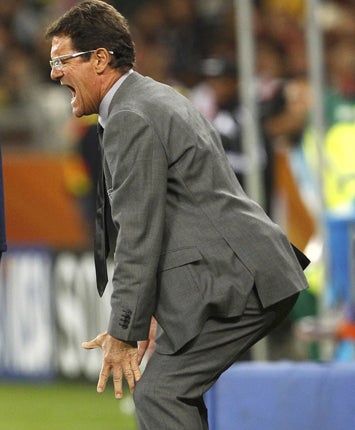'Angry' Capello disowns his own Index

Your support helps us to tell the story
From reproductive rights to climate change to Big Tech, The Independent is on the ground when the story is developing. Whether it's investigating the financials of Elon Musk's pro-Trump PAC or producing our latest documentary, 'The A Word', which shines a light on the American women fighting for reproductive rights, we know how important it is to parse out the facts from the messaging.
At such a critical moment in US history, we need reporters on the ground. Your donation allows us to keep sending journalists to speak to both sides of the story.
The Independent is trusted by Americans across the entire political spectrum. And unlike many other quality news outlets, we choose not to lock Americans out of our reporting and analysis with paywalls. We believe quality journalism should be available to everyone, paid for by those who can afford it.
Your support makes all the difference.Fabio Capello's embarrassing summer took another lurch for the worse yesterday after he was forced to disassociate himself from his own "Capello Index", a supposedly sophisticated system being used to rank players from all over the world, including the England team.
His intervention came too late to prevent publication of marks for the squad's individual efforts during a lamentable World Cup campaign. They revealed that the worst performers were Robert Green, Joe Cole, Glen Johnson, Gareth Barry, Ledley King and Aaron Lennon. No England names appeared in the top 45 players from the tournament, which was headed by Uruguay's Diego Forlan with 68.95 per cent. Jermain Defoe was given the top English mark of 62.47, based mainly on his performance in scoring during the group game against Slovenia. Green, whose blunder allowed the United States to draw in the opener, was bottom with 51.67.
The Capello Index website had been dogged by bad publicity from the time it was unveiled the day before the manager announced his squad of 23 for the World Cup; not least because a Norwegian entrepreneur alleged the idea had been stolen from him by Capello and his business partner Chicco Merighi. "Rank stupidity" was one of the headlines.
Apparently failing to understand the fuss, Capello suggested that publication of bad marks during the tournament could encourage under-performing players. In fact, it would have increased tensions in the camp. That became apparent in as soon as results began to go badly.
The Football Association convinced him to postpone the project until after the World Cup, but were embarrassed yesterday when full details from the website were published in a national newspaper. An FA statement said: "The index ratings has (sic) not been seen or approved by Mr Capello [and] were published without his knowledge." The marks have now been taken down and it is understood Capello will have nothing more to do with the project while he remains England manager. Capello yesterday declared himself "angry", saying in a statement: "I did not authorise this and am angry the index was published."
The only possible defence was that, like the Opta System used to analyse Premier League performances, the Capello Index was a strictly statistical tool, as opposed to one based on subjective judgements. The website claims to be "the first real official football player ratings system capable of coherently evaluating player performance in different leagues and countries."
It lists a whole series of criteria such as "long-range passing", "dribbling and acceleration with the ball," and "sendings-off, bookings and fouls". All this was worked out "thanks to the invaluable contribution of Fabio Capello". Now he may finally have accepted that attaching his name to it was a serious mistake.
A further blow to the credibility of a manager who just two months ago appeared to possess the Midas touch is Sir Trevor Brooking's declaration that Capello's successor should be an Englishman. Brooking, the FA's head of technical development, also wants another Englishman to work with Capello's Italian coaching team, which lacks significant English influence when Stuart Pearce is away with the Under-21 team. That happens on most occasions when the senior team play, with Pearce unable to join up until match-day. He is seen as an unlikely successor and the FA are now desperate to encourage more home-grown coaching talent.
Join our commenting forum
Join thought-provoking conversations, follow other Independent readers and see their replies
Comments